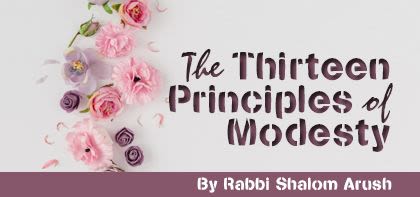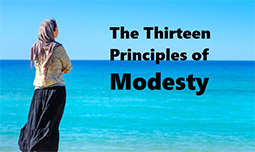
The Thirteen Principles of Modesty
Rebbetzin Ahava Margaretten reveals an amazing parallel between the Rambam's 13 Principles of Faith and the principles of modesty in Judaism…

Rabbi Moses ben Maimon, also called the Rambam or Maimonides, wrote the 13 Principles of Jewish Faith in the 12th century. Some congregations recite them every day after the morning prayers.
Our Rabbis teach us that modesty is a woman’s most critical and fundamental mitzvah, and that it grants her the greatest amount of reward (Daughters of Dignity, pg 89).
Following is a collection of modesty teachings that relate to the 13 Principles of Jewish Faith.
1. Hashem is the Creator and Ruler of all things, and He wants the very best for us. As women, we have been given an awesome opportunity to earn unimaginable rewards. Men don’t have a mitzvah that encompasses their whole body in a direct way. They sit in a sukkah, but that is passive involvement of their bodies. We are privileged to have every limb take part in the mitzvah of modesty by choosing to adorn ourselves with modest garments (Rabbi P.E. Falk).
2. A woman who dresses modestly shows her belief in Hashem’s existence. She connects her soul to the one True G-d by fulfilling the commandments of modesty (Rabbi David Aaron).
3. Hashem has no physical form, and we have a spark of Him inside us. By covering our physical bodies with modest clothing, this subdues our negative inclination so we can emulate Hashem (Rabbi Don Segal).
4. We trust that our Manufacturer knows what’s best for His creations. When Hashem formed the first woman Eve, He instructed her over and over again, “Be a modest woman.” (Daughters of Dignity, pg 15).
5. The Master of the Universe readily accepts the prayers of a modest woman. Her supplications are very  important in heaven. (Daughters of Dignity, pg 46; Tanna D’bei Eliyahu).
important in heaven. (Daughters of Dignity, pg 46; Tanna D’bei Eliyahu).
6. The teachings of our Prophets are true: “What does G-d ask of you? To do justice, to love kindness, and to walk modestly with your G-d.” (Micah 6:8).
7. Moses was the only man who knew Hashem “face to face.” He was also called “The humblest of men” (Deuteronomy 34:10, Numbers 12:3). Here is a connection between humility and closeness to Hashem. A woman desiring to get closer to Hashem can improve her modesty, which is an outward manifestation of humility (Oz Vehadar Levusha, pg 43).
8. The Torah’s laws and teachings are Hashem’s Will. By carefully following the laws of modesty, we are performing Hashem’s Will (Nefesh HaChaim, 4:6).
9. No matter how many secular styles come into existence, the Torah’s rules for modest dressing will not change (Deuteronomy 4:2).
10. When a woman dresses in the morning, the intention she has is very important. Does she say, “What shall I wear to look attractive today?” Or does she say, “What should I wear that will not cause men to stumble with their thoughts?” Her efforts in modest dressing are recorded in heaven as an outstanding merit for her (Rabbi Yehuda Levin).
11. When we make a sacrifice for the sake of modesty, Hashem pays us back many times over. Rabbi Mattisyahu Solomon, shlit”a reassures us, “Yes, these sacrifices are difficult and sometimes expensive, yet no money in the world can pay for the merits a woman earns as a result of sacrificing an inappropriate garment.” (Daughters of Dignity, pg 101).
12. We await Mashiach’s arrival every day. What will hasten his arrival? The Satmar Rav zt”l reveals the answer: “At the time of the Ultimate Redemption, Mashiach will point to the modest women in the generation and proclaim, ‘As a result of your exemplary modesty, you have hastened my arrival!’” (Daughters of Dignity, pg 226).
13. A modest woman will merit Resurrection of the Dead when Mashiach comes. The Chazon Ish explains that when a woman is dressed modestly, beads of sweat may form on her being. Hashem stores these droplets in His treasure house. In the future, these droplets will revive her to everlasting life, an eternal reward for dressing modestly. (Daughters of Dignity, pg 47).
By the way, dressing modestly in hot weather is the most effective way to stay cool. Scientists say that long-sleeve cotton clothing stops sunlight and outside heat from reaching the skin, keeping the person cooler. The cotton also allows the skin to ventilate naturally, while protecting the person from sunburns.
As for head-coverings in hot weather, a woman in a headscarf stays cooler than if she wore none at all. The cloth shields her scalp from sunlight, which carries lots of heat. For extra cooling, get the scarf or snood lightly damp with water before putting it on.
Here we see that excelling in modesty is good for us spiritually and physically! As Proverbs 3:17 states, “The ways [of the Torah] are pleasant and all its paths are peaceful.”








2/12/2022
This is where you see the most beautiful rule of the Torah: “Whoever makes a mitzva, doesn’t get hurt from it”. Baruch Hashem, I have experienced this and I always cherish that moment, even if it seems simple. When I finally marry a Noahide man and have daughters and sons, I will teach them the wonders and magnificent acts of Our Beloved Creator… Be’Ezrat Hashem, many more generations will learn more about the importance of tzniut!
5/28/2018
Beautiful & brilliant!
What a marvelous chiddush — never considered this before.
5/28/2018
What a marvelous chiddush — never considered this before.